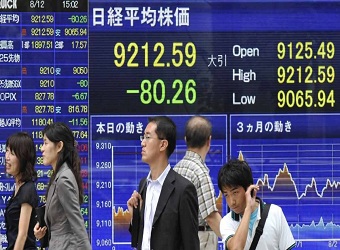Major Asian markets traded mostly lower on Wednesday despite a solid lead from Wall Street overnight, but Hong Kong stocks bucked the trend.
In Japan, the Nikkei 225 declined 0.14 percent despite broad gains across auto stocks and financial plays. Major automakers posted gains: Toyota rose 2.02 percent, Honda was up 2.42 percent and Mitsubishi Motors added 3.93 percent. Banking stocks were also up with Sumitomo Mitsui Financial Group adding 2.24 percent and Mitsubishi UFJ up 1.55 percent. Energy names also traded higher with Inpex shares gaining 2.75 percent.
But shares of SoftBank and Fast Retailing — two heavily-weighted names on the Nikkei stock average — were down 0.56 percent and 0.72 percent, respectively.
Over in Seoul, the benchmark Kospi index declined 0.25 percent. Shares of tech giant Samsung Electronics fell 2.74 percent Wednesday morning. The stock declined in the Tuesday session on the back of a weaker-than-expected fourth-quarter profit guidance, prompting concerns about the business outlook for its semiconductor business. Rival memory chip maker SK Hynix tumbled 4.94 percent.
Australia’s S&P/ASX 200 shed 0.52 percent in afternoon trade as most sectors declined. The gold subindex saw the steepest decline, down 1.73 percent, as miners struggled: Newcrest shares fell 2.11 percent, Evolution Mining was down 1.18 percent and Kingsgate tumbled 6.33 percent.
Major banking stocks traded mixed as ANZ shares slipped 0.4 percent, Commonwealth Bank was down 0.54 percent and the National Australia Bank fell 0.37 percent. Westpac shares rose 0.22 percent.
Hong Kong’s Hang Seng index rose 0.68 percent after opening nearly flat. The index closed higher for the 11th straight session on Tuesday, marking its longest win streak since 1991, and is now eyeing a 12th consecutive day of gains. Currently trading at 31,223.19, the index is inching towards its all-time high of 31,958.41, which was set in 2007.
The Shanghai composite was up 0.35 percent in the afternoon. Meanwhile, the Shenzhen composite traded down 0.36 percent. The moves followed price data out of the country: Consumer inflation in China rose 1.8 percent on-year in December, which was a touch lower than the market’s expectations, while the producer price index topped predictions to climb 4.9 percent on-year, according to Reuters.
U.S. stocks closed higher on Tuesday in the lead up to earnings season kicking off later this week, with investors positive about the upcoming release of fourth-quarter results. Major U.S. banks, including J.P. Morgan, are set to report on Friday.
The Dow Jones industrial average rose 0.41 percent, or 102.8 points, to close at 25,385.8.
The yield on the 10-year U.S. Treasury note rose to a nine-month high overnight after the Bank of Japan on Tuesday moved to slightly reduce its long-dated Japanese government bond purchases.
“Although the decrease [from the BOJ] was modest, it broadens the number of global policymakers stepping away from the markets,” Kathy Lien, managing director of FX strategy at BK Asset Management, said in a note.
The 10-year yield last stood at 2.55 percent.
In currencies, the Japanese yen traded at 112.30 to the dollar at 12:14 p.m. HK/SIN, coming off an earlier session high of 112.15. That compared to levels around the 113 handle seen earlier this week before the BOJ’s Tuesday move to slightly trim its purchases of Japanese government bonds.
Meanwhile, the dollar index traded at 92.450 against a basket of currencies.
On the commodities front, oil prices extended gains seen on Tuesday. U.S. crude futures rose 0.81 percent to trade at $63.47 a barrel and Brent crude added 0.81 percent to $69.47.
Toyota announced in a Tuesday statement that it would recall around 601,300 more vehicles in the U.S. due to safety issues related to Takata air bag inflators. The affected air bags have already been associated with at least 20 deaths, Reuters said.
Meanwhile, dealings in shares of Glencore on the Hong Kong market are set to cease on Wednesday after the miner announced last year it would de-list from the Hong Kong Exchange. In a statement last October, Glencore said its Hong Kong-listed shares accounted for 0.3 percent of its total issued share capital. The de-listing is expected to be effective January 31. Source: CNBC
Source: CNBC
